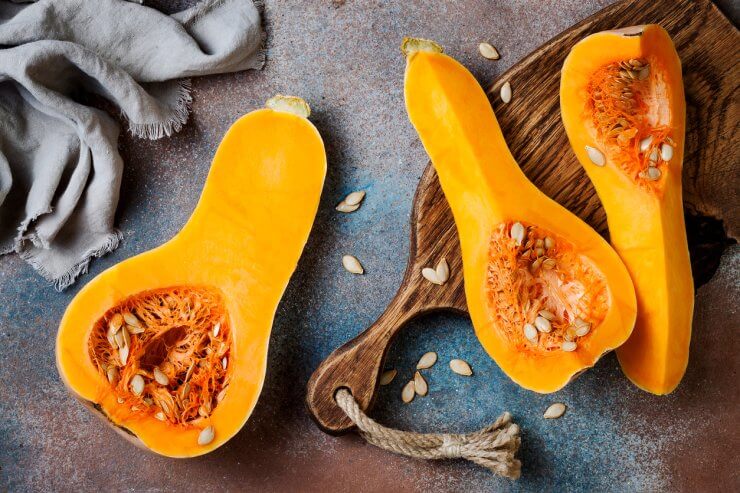
Healthy butternut squash on cutting board
Winter squash come in a variety of shapes and sizes, but they all have one thing in common: they are high in nutrition and low in calories.
Here are some of the ways winter squash contributes to good health. We’re going to take a closer look at one of the most popular winter squashes—butternut squash.
Heart Health
Butternut squash is packed with potassium, which can help with high blood pressure. The potassium helps counteract the negative effects of sodium on blood pressure. Lower blood pressure means a reduced risk of heart disease and stroke.
Blood Sugar & Digestive Health
Butternut squash has a type of fiber that the body can’t digest, which can actually be a good thing for folks with diabetes. This fiber help keep a person’s blood sugar from rising after they eat. The carbs in butternut squash are also digested more slowly than many other foods—another way to keep blood sugar in check.
Immunity System Support
Butternut squash is full of the compounds alpha-carotene and beta-carotene. Your body converts these compounds to vitamin A, which is vital for your immune system.
Vision Health
Butternut squash contains lutein and zeaxanthin. These antioxidants, along with beta-carotene and vitamin A, all contribute to protect your eyes from ultraviolet rays.
Cancer Protection
Certain compounds in squash, like beta-carotene and lutein, have been researched for their role in preventing cancer growth. These compounds, called flavonoids, may help protect human cells from oxidation, which can lead to cancer.
Healthy Weight
Fiber slows down digestive time in your gastrointestinal tract, reducing the impact on blood sugar, making you feel fuller longer, and contributing to an overall healthy digestive system. This is true of butternut squash and many of its fellow squashes, with the exception of spaghetti squash. You’d think spaghetti squash, with its stringy flesh, would have more fiber than most other squashes. Actually, it has less fiber and fewer vitamins. But it’s low in calories and carbs, so don’t pass it by!
Skin Care
Pureed squash forms the foundation of some home skin care treatments.
Brightening Facial Mask:
- egg
- 1 cup pureed butternut squash
- 1 teaspoon honey or apple cider
Mix all ingredients in a bowl. Apply to your face and let it sit for 10 minutes. Rinse with warm water.
Home Spa Foot Smoothie:
- 1 cooked and mashed butternut squash, cooled
- 3 cups whole milk
- 2 cups vegetable oil
Mix all ingredients in a large bucket that will accommodate your feet. Sit and soak your feet in the mixture for at least a half hour. Rinse with warm water and put on soft comfy socks to hold in the moisture. The vitamin E in butternut squash is good for your skin.
Did you know that winter squash was so healthful? Please tell us your biggest reason for growing and eating winter squash.


 Previous
Previous

